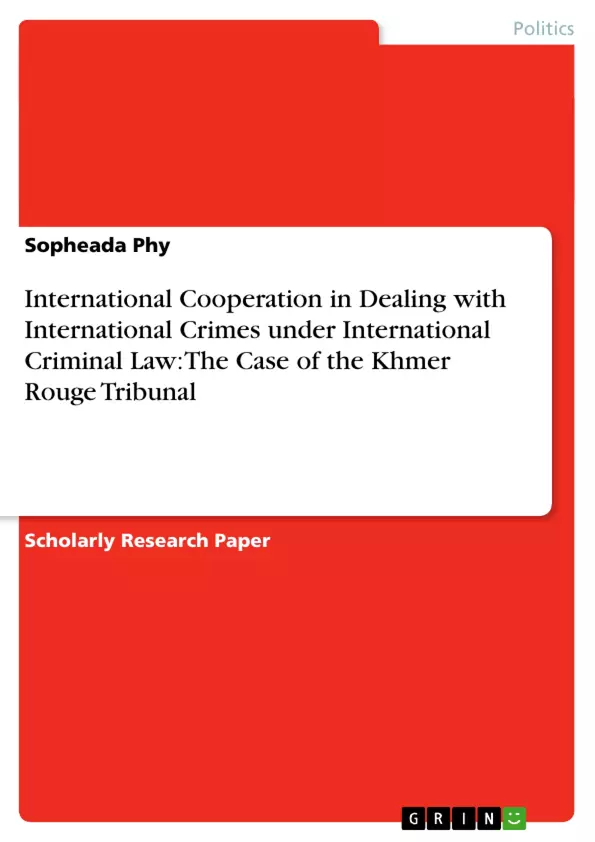Traditional international law considered the sovereignty of state as the core principle and
state cannot be interfered by other states or international community even though it is failed to
protect its people. The modern international law developed when the Peace of Westphalia was
signed in 1648. With this development, the principle of sovereignty of state has been gradually
replaced with the principle of international community as every state more or less is dependent,
particularly in terms of economics and politics, in order to survive in the world community. In
this regard, each state came into agreement on trade, diplomacy and so on with the others. So
each is bound by international law either treaty, customary international law, or other sources of
international law. Regarding the international crimes under international criminal law such as
genocide, crimes against humanity, and war crimes, most of the states more or less are bound by
them, significantly under the 1948-Convention on the Prevention and Punishment of the Crime
of Genocide, 1968-Convention on the Non-Applicability of Statutory Limitations to War Crimes
and Crimes against Humanity, and the 2002-Rome Statute of the International Criminal Court
(ICC).
Throughout the history, a number of genocide, crimes against humanity and war crimes
happened, but only were four ad hoc tribunals right away created to prosecute the criminals
before the ICC came into being in 2002. Those are the 1945-Nuremberg Tribunal, the 1946-
Tokyo Tribunal, the 1993-International Criminal Tribunal for the Former Yugoslavia, and the
1994-International Criminal Tribunal for Rwanda. However, such a thing was not undertaken in
Cambodia after the Khmer Rouge regime collapse in 1979. The Khmer Rouge Tribunal is
selected to study because it is the only tribunal established very late after the carelessness of the
international community and the prolonged and often acrimonious cooperation and negotiation
between the Cambodian government and the UN, unlike the others. [...]
Inhaltsverzeichnis (Table of Contents)
- Introduction
- The Definitions of International Crimes
- The International Cooperation in Dealing with International Crimes: The Creation of the Permanent International Criminal Court in the 21st Century
Zielsetzung und Themenschwerpunkte (Objectives and Key Themes)
This research paper aims to examine the role of international cooperation in addressing international crimes under international criminal law, using the Khmer Rouge Tribunal as a case study. The paper will first define international crimes under international law, then analyze the development of the International Criminal Court (ICC) as a permanent institution for prosecuting such crimes. Finally, it will explore the cooperation between the Cambodian government and the United Nations in establishing and operating the Khmer Rouge Tribunal.- Defining international crimes under international criminal law, including genocide, crimes against humanity, and war crimes.
- Analyzing the historical development of international cooperation in dealing with international crimes, highlighting the key milestones and challenges.
- Examining the establishment of the International Criminal Court (ICC) as a permanent institution to address international crimes.
- Exploring the cooperation between the Cambodian government and the United Nations in establishing and operating the Khmer Rouge Tribunal.
- Assessing the effectiveness of the Khmer Rouge Tribunal in achieving justice for Cambodian victims.
Zusammenfassung der Kapitel (Chapter Summaries)
- The introduction sets the stage for the research by discussing the shift from traditional international law based on state sovereignty to modern international law based on the principle of international community. It highlights the development of international law regarding crimes such as genocide, crimes against humanity, and war crimes, and emphasizes the role of international cooperation in establishing tribunals to prosecute perpetrators of these crimes.
- The second chapter provides a comprehensive overview of international crimes under international law, focusing on the definitions of genocide, crimes against humanity, and war crimes. It draws upon the Rome Statute of the International Criminal Court and other relevant legal documents to provide a clear understanding of these offenses.
- The third chapter delves into the history of international cooperation in dealing with international crimes, tracing the path towards the establishment of the International Criminal Court (ICC). It discusses key milestones in the development of international criminal law, including the Nuremberg and Tokyo Tribunals, the creation of ad hoc tribunals for the former Yugoslavia and Rwanda, and ultimately the establishment of the ICC in 2002.
Schlüsselwörter (Keywords)
This research paper explores key concepts such as international criminal law, international cooperation, genocide, crimes against humanity, war crimes, the International Criminal Court (ICC), the Khmer Rouge Tribunal, transitional justice, and victim rights. It delves into the historical context of international crimes and examines the development of international institutions and legal frameworks for addressing these offenses. The paper also analyzes the challenges and successes of the Khmer Rouge Tribunal, highlighting the complex dynamics of international cooperation and the pursuit of justice for victims of mass atrocities.Frequently Asked Questions
What is the Khmer Rouge Tribunal?
It is a special court established through cooperation between the Cambodian government and the United Nations to prosecute crimes committed during the Khmer Rouge regime.
How does modern international law view state sovereignty?
Modern law has shifted from absolute sovereignty to the principle of international community, allowing for intervention when a state fails to protect its people from mass atrocities.
What types of crimes are prosecuted under international criminal law?
The main categories are genocide, crimes against humanity, and war crimes, as defined by the 2002 Rome Statute of the International Criminal Court (ICC).
Why was the Khmer Rouge Tribunal unique compared to others?
Unlike ad hoc tribunals for Rwanda or Yugoslavia, the Khmer Rouge Tribunal was established much later (long after 1979) after prolonged and difficult negotiations.
What is the role of the International Criminal Court (ICC)?
The ICC serves as a permanent institution created to address international crimes when national courts are unwilling or unable to do so.
- Quote paper
- Sopheada Phy (Author), 2009, International Cooperation in Dealing with International Crimes under International Criminal Law: The Case of the Khmer Rouge Tribunal, Munich, GRIN Verlag, https://www.grin.com/document/149283



